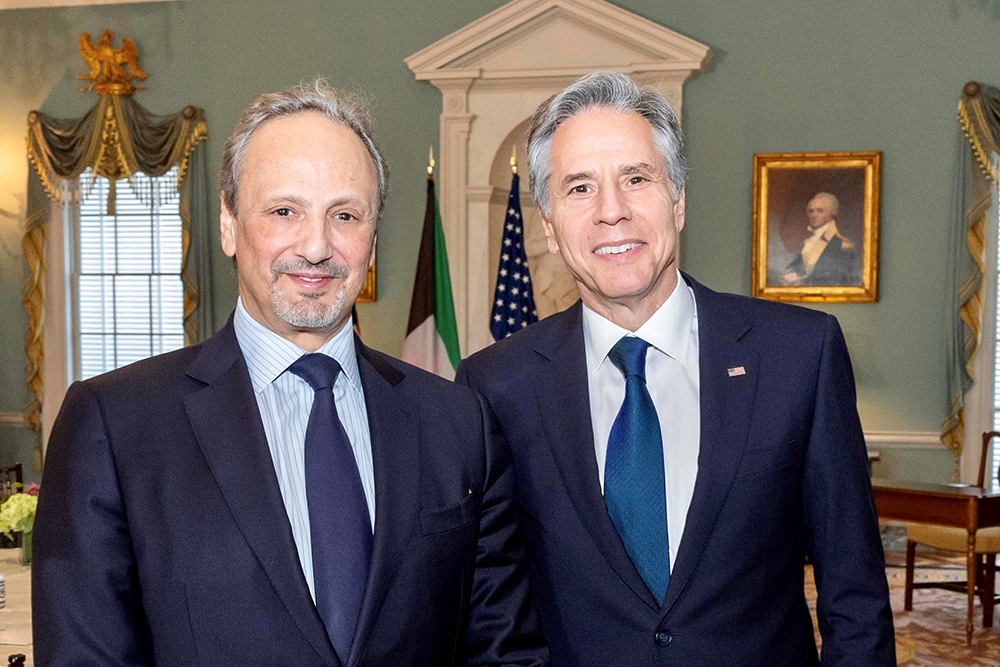WASHINGTON: US Secretary of State Antony Blinken said Kuwait plays a vital role in Middle East and world peace during official talks held with visiting Kuwaiti Foreign Minister Sheikh Salem Al-Abdullah Al-Jaber Al-Sabah in Washington, adding both sides share views on a variety of issues including Syria, Yemen and the entire Middle East region. The US secretary also voiced gratitude to Kuwait for its efforts aiming at revolving the Sudanese crisis.
The Kuwaiti foreign minister said Kuwait and the US have a very strong strategic partnership and friendship, saying he will discuss with his US counterpart how to promote this partnership. He said the US plays an important role in maintaining peace and security in the region, hoping it would continue playing its role in maintaining regional stability. He added that amid the numerous regional and international crises, Kuwait, as a bridge-builder, tries to resolve such conflicts by peaceful means.
Speaking to KUNA following the meeting, Sheikh Salem said he had a “good” meeting with his US counterpart in Washington, adding he had asked Blinken to convey the greetings of HH the Amir Sheikh Nawaf Al-Ahmad Al-Jaber Al-Sabah and HH the Crown Prince Sheikh Mishal Al-Ahmad Al-Jaber Al-Sabah to US President Joe Biden. He noted the talks represented an opportunity for them to look into aspects of strong and firm relations between Kuwait and the US.
Sheikh Salem added they also discussed the sixth round of strategic dialogue due in Kuwait in October, voicing shared satisfaction with the current level of bilateral relations. He said the latest regional and international developments, mainly the serious escalation in occupied Palestinian territories, and Syria, were also addressed. He thanked the US and Saudi Arabia for their efforts to put an end to the bloody conflict in Sudan.
During the official talks, Sheikh Salem commended Kuwaiti-US strategic partnership and distinguished cooperation between both friendly countries at all levels and in various fields, based on pillars of security and defense, promotion of investment, exchange of expertise and development of education and medicine and others. He also spoke highly of firm and close cooperation between both sides at international gatherings, hoping that this level of bilateral coordination would continue. Blinken voiced much gratitude to Kuwait for its efforts in the evacuation of US citizens from Sudan amid critical and complicated security conditions. He also commended distinguished friendship and existing strategic partnership with Kuwait in all fields, hoping that it would be expanded to cover more domains. Blinken lauded existing communication and coordination between both friendly countries on the international scene, while hailing Kuwait’s wise and balanced foreign policy and fervent efforts to ensure regional security and peace.
During the official talks, both sides discussed the latest regional and international developments, including in Sudan, and shared views on a set of vital regional issues and ways of promoting bilateral cooperation to ensure peace and stability worldwide. In this regard, the Kuwaiti foreign minister spoke highly of joint efforts being exerted by the US and Saudi Arabia to put an end to ongoing fighting between Sudanese rivals and resolve the crisis through dialogue.
They also addressed the developments of Syria, Palestine, Iraq and Yemen, vowing joint efforts to strengthen security and stability in the region. The meeting was attended by Kuwait’s Ambassador to the United States Sheikha Al-Zain Sabah Nasser Al-Saud Al-Sabah, Assistant Foreign Minister for the Foreign Minister’s Office Affairs/Minister Plenipotentiary Nawaf Al-Ahmad and a number of senior officials of Kuwait’s ministry of foreign affairs and the embassy in Washington. This is the first official visit by the Kuwaiti foreign minister to Washington since he took up his position.
Meanwhile, the US said Friday it was sending reinforcements to the Gulf after what it called increasing harassment by Iran of ships in the oil-rich waters. “The Department of Defense will be making a series of moves to bolster our defensive posture” in the Gulf, National Security Council spokesman John Kirby told reporters, saying there would be “details on those reinforcements in coming days”.
The US Navy’s Fifth Fleet, based in Bahrain, said in a statement that it was “working with regional allies and partners to increase the rotation of ships and aircraft” that patrol the Strait of Hormuz, the crucial chokepoint into the Gulf. Kirby said that Iran, which has tense relations with the United States — although it has recently been repairing ties with Arab neighbors — has “harassed, attacked or interfered” with 15 internationally flagged merchant vessels over the past 15 years.
“We’ve seen repeated Iranian threats, arm seizures and attacks against commercial shippers who are exercising their navigational rights and freedoms in international waters and strategic waterways of the region,” Kirby said. “The United States will not allow foreign or regional powers to jeopardize freedom of navigation through the Middle East waterways including the Strait of Hormuz,” he said. – Agencies










